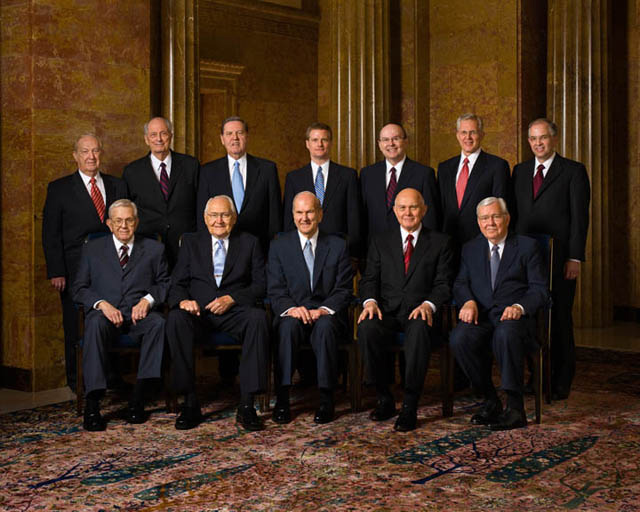Joseph Smith, the first prophet of the modern Mormon Church, once wrote thirteen basic principles of Mormon beliefs. These are called The Articles of Faith. The seventh says: “We believe in the gift of tongues, prophecy, revelation, visions, healing, interpretation of tongues, and so forth.”
 So, yes, Mormons believe in speaking in tongues. Paul listed speaking in tongues as one of the gifts of the spirit in 1 Corinthians 12. It refers to the ability to speak, understand, or interpret a language the person does not know.
So, yes, Mormons believe in speaking in tongues. Paul listed speaking in tongues as one of the gifts of the spirit in 1 Corinthians 12. It refers to the ability to speak, understand, or interpret a language the person does not know.
However, Mormons approach this gift a bit differently than some religions do. We believe there must be a practical reason for speaking in tongues or in interpreting tongues. For instance, a missionary might be new in a country and not able to speak the language very well yet. However, he finds himself talking to someone who has a very serious question and who is spiritually prepared to learn truth. The missionary may find that he is able to answer the question as if he spoke fluently.
In order for the gift of tongues to be used, there must be listeners who understand the words being spoken and who need to be able to understand the words. It is not used for entertainment or simply to prove a person is filled with the spirit. In fact, most full-time missionaries who are sent to serve in a mission requiring a new language experience the gift of tongues. While mastering a new language usually takes many, many years, missionaries master their language surprisingly quickly, even when they’ve struggled with new languages in school. When a person sets out to do God’s work, God steps in to help him to it successfully, and this can include giving him the ability to learn a new language—the gift of tongues.
The gift of tongues helped Joseph Smith, the first Mormon prophet, translate the Book of Mormon from a language he most certainly did not know and so, this gift of the spirit is central to the foundations of the Mormon Church. God required him to study it out, work at it, and listen to promptings from the spirit to help him do the necessary work.
Joseph Smith warned church members in early days to be careful about the gift of tongues. He wanted them to use it only for teaching the gospel to someone who spoke a different language, to use it only as prompted by the spirit, and to be certain there was an interpreter—there is no purpose in speaking in tongues if there is no one who can understand.
Following are some things Joseph Smith taught about the gift of tongues:
Be not so curious about tongues, do not speak in tongues except there be an interpreter present; the ultimate design of tongues is to speak to foreigners, and if persons are very anxious to display their intelligence, let them speak to such in their own tongues. The gifts of God are all useful in their place, but when they are applied to that which God does not intend, they prove an injury, a snare and a curse instead of a blessing.” (See History of the Church, 5:31–32; from “Gift of the Holy Ghost, an editorial published in Times and Seasons, June 15, 1842, pp. 825–26; Joseph Smith was the editor of the periodical.)
We have also had brethren and sisters who have had the gift of tongues falsely; they would speak in a muttering, unnatural voice, and their bodies be distorted … ; whereas, there is nothing unnatural in the Spirit of God. (See History of the Church, 4:580; punctuation modernized; from “Try the Spirits,” an editorial published in Times and Seasons, Apr. 1, 1842, p. 747; Joseph Smith was the editor of the periodical.)
Speak not in the gift of tongues without understanding it, or without interpretation. The devil can speak in tongues; the adversary will come with his work; he can tempt all classes; can speak in English or Dutch. Let no one speak in tongues unless he interpret, except by the consent of the one who is placed to preside; then he may discern or interpret, or another may. (See History of the Church, 3:392; from a discourse given by Joseph Smith about July 1839 in Commerce, Illinois; reported by Willard Richards.)
All of these quotes, with more from Joseph Smith on the subject, can be found in “Chapter 33: The Spiritual Gifts of Healing, Tongues, Prophecy, and Discerning of Spirits,” Teachings of Presidents of the Church: Joseph Smith, (2007)
About Terrie Lynn Bittner
The late Terrie Lynn Bittner—beloved wife, mother, grandmother, and friend—was the author of two homeschooling books and numerous articles, including several that appeared in Latter-day Saint magazines. She became a member of the Church at the age of 17 and began sharing her faith online in 1992.






do Mormons believe Jesus rose from the dead
Yes, we do. Here is a great video depicting the resurrection of Jesus Christ:
http://www.youtube.com/watch?v=bAuaSpJ7zGs&feature=share&list=PL4A73DDEE675FBC39&index=43
if I’m gay can I still be Mormon??
The answer to this question is an absolute, unequivocal yes. Of course! God loves all of His children regardless of race, gender, sexuality, etc. His love is unconditional.
While we don’t support same-sex relationships (or any sexual relationship outside of marriage, straight or homosexual), we recognize that God loves all of His children equally.
For more information on this and other questions relating to being a gay Mormon, mormonandgay.lds.org is a great resource.
If im confused on my sexuality will lord show me the way? if im gay will he still answer my prayers? what if my bishop hates gays and wont help me? where do i go? Am I MOrmon
I agree with Amy, you matter. You are a Mormon. And God LOVES YOU more than you can ever know. That love never changes, even when we are confused and struggling. If your Bishop isn’t someone you can trust, go to your Stake President. If you can’t trust him either, pray to find someone you can trust. I found my young women’s leaders were my best resources. You deserve the guidance of the Lord, but sometimes men are weak and too blind to see what God wants. Don’t listen if they try to make you feel small. You matter. No matter what!
Just interested